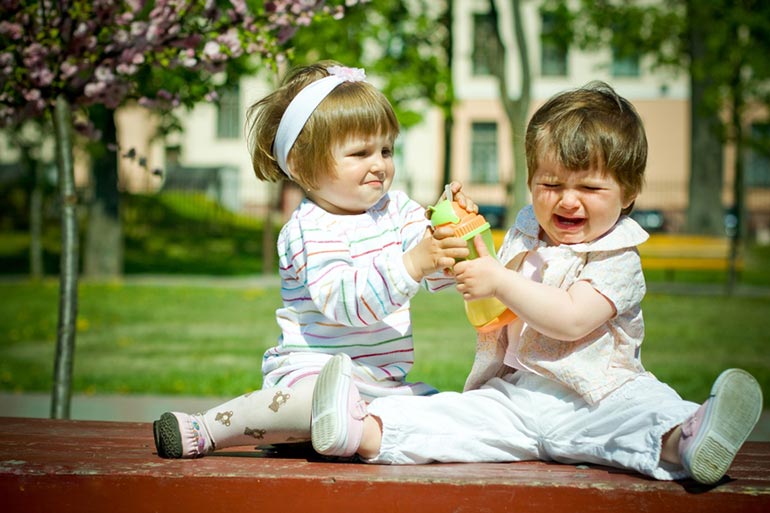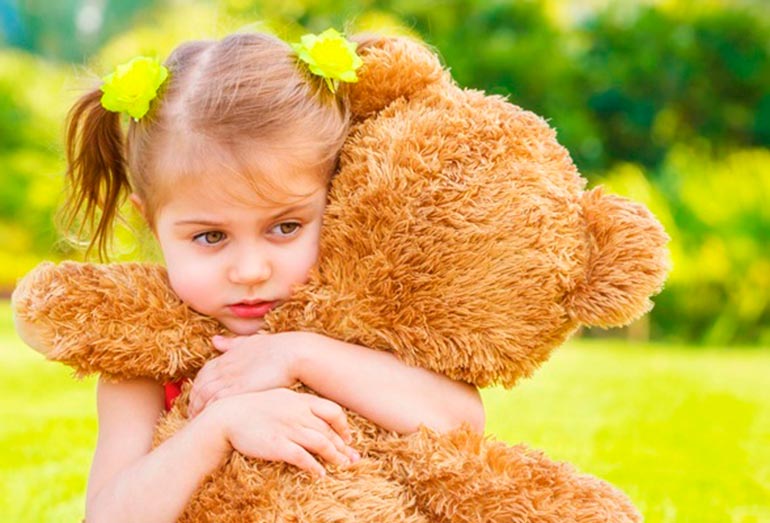Not so long ago I received a letter. It says:
"Hello. I have two children, my son is 4 years old, and my daughter is 2. The son often offends his sister, is greedy. We recently bought him a machine that he loves. He rides her at home. When a sister wants to just sit on her, he does not allow. But she’s so interested, she’s such an age. I constantly teach my son to share toys with other children, explain what is so right. But he still does not allow it, shouting: “This is my toy! Do not touch!" How to explain to the child that he is not greedy? The husband is almost never at home; he works a lot. I’m with the kids all the time, my husband doesn’t deal with children. Tell me how to teach our children to get along with each other? ”
I want to say thanks to Svetlana for this letter, for the interesting question raised in it. This topic is relevant for many families, so I decided to write this article.
Let's figure it out
Many parents believe that their children must share their toys, which is so right. If the son or daughter refuses to do this, then they are called greedy. Think, are we adults ready to share our mobile phone, laptop, jewelry, give them our purse or a car with other people? Really, if we do not share these things, then we are greedy? Of course not, that’s even funny.
For a child, his favorite toys are very valuable, as for adults, their personal belongings. Therefore, children have every right to dispose of their things themselves. They may not allow other children and even relatives to take their toys. This is their right, it must be respected.
We are not talking about common items. We do not discuss those situations when you need to equally divide sweets or a piece of cake. We are talking about the personal things of a child that were donated or bought specifically for him. Only he decides what to do with them - to share them or not.
If mother or father insistently ask the older child to give his toy (or any other personal thing, especially his favorite) to the younger one, they seem to deprive him of the right to dispose of his personal belongings. If we are talking about a favorite toy, it is natural that the older child will feel bewildered and this, of course, leads to jealousy between the children.
The eldest son or daughter will be offended by the parents, because they do not take into account his feelings. It turns out that the needs of the youngest child in a toy are rated higher than the feelings of the older one, who is trying to protect his personal space and its borders.
Be calm if the children do not want to give each other their toys. Try to explain to both that each of the kids decides how to dispose of his toys. You can do something like this: “Son, this is your brother’s car. He does not want to give it, it is his right. You have your toys too? You can decide whether to share them or not. ”
To teach children to always share toys with everyone is to some extent dangerous. Children who are told that it is necessary to share with everyone and say “no” cannot grow up into adults who will find it difficult to refuse other people, they will not be able to say “no”, they will not learn to defend their interests, they will try to please others constantly and everywhere, even contrary to their own interests, because from childhood they were taught and educated that their needs and feelings do not matter.
The other extreme that such upbringing can lead to is to compensate for the shortfall in childhood, an adult will be too stingy where it is necessary to give and share.
Parent Tips
[sc name = ”rsa”]
- Each of the children in the family should have their own toys, except for common ones;
- Children need to buy new toys at the same time. If the elder was presented with a car, then immediately buy the younger one what he likes. Birthday gifts are an exception to this rule;
- Arrange for each of the children a separate corner or place / shelf / box / container where they will store their toys;
- Teach kids that everyone can take common toys and play them at any time. However, you need to ask permission from your brother or sister when you want to take his personal toy. Explain to the children that you need to reckon with the desires of other people and respect his right to refuse;
- Teach children to correctly and politely ask for permission to take another thing or exchange toys for a while. Explain how to properly respond to a brother or sister’s refusal - teach to respect the refusal with respect. Explain that everyone may not be allowed to take their things. Tell your child: “Your brother does not want to share with anyone. That is his right. It happens. You do this too sometimes. His decision must be respected ”;
- What to do if parents bought one toy for all children? If the children can’t share it in any way, it will be wise to establish some kind of game schedule for each of the children. For example, the older one can play as much as she wants on Mondays, Wednesdays, and Fridays, and the youngest - on the remaining days of the week. You can hang such a schedule on the wall in the nursery (for older children). It is not necessary to use such a schedule, think of your own rules for using the toy. It is important that time is distributed fairly. No one should be deprived. Parents, do not make concessions to younger children at the expense of older ones. Regardless of gender or age, each of the children has an unconditional right to play with a toy;
- If a child does not want to share his toy with other children, never affix the label “greed” to the child, this is very insulting and humiliating. It is as if you are telling a child: “Not wanting to give your favorite thing to another person is shameful and bad. You should!" Put yourself in the place of the baby and immediately remember yourself in a situation when you are asked to give him your laptop, phone or clothes, and you refuse, imagine that after that you will be called a dishonorable and mean person!
As for Svetlana, who wrote to me, in her situation I would have done this - I would have bought a baby a similar car or another toy that I can ride on. At the same time, you should talk with your son so that he plays with his car in another room where the younger sister does not see him.
To summarize
When children do not want to share toys with each other, parents should not sound the alarm, take this calmly and with understanding. This is normal and does not mean that something is wrong with the children. These are their personal belongings, they have the right to dispose of them at their discretion.
Teach children to ask permission to play with the toys of another child, learn to negotiate, exchange toys, but also respect the right of others to refuse. Explain to the children that you must respect the refusals, because each person has his own personal space, in which no one has the right to intrude.
We also read:
- My child is a greedy - what to do? Fight or put up? Reasons for childhood greed
- What if the child does not share toys?
Specialist consultation: why the child does not want to share?
How to raise a child so that he is not greedy and learn to share his toys and things with other children? The reasons and recommendations to parents are told by a psychologist, the creator of the First Children’s Academy and School of Professional Parents, a business coach and mother of four (for two with her husband) children, Marina Romanenko:












I believe that toys are personal belongings of children. Therefore, each child should have their own and he will share them at his own discretion. It is not necessary to force the child to share his toys, especially with other people's children, as he will enter into adulthood as an insecure person and complexes may appear. It is necessary to act in the interests of the child who owns this or that toy.
I see absolutely no reason for alarm. Childish greed and theft are typical occurrences for young children. I remember myself. I had a lot of toys at home, but my sister and I quarreled anyway and even fought over them. And once I brought home a stolen toy from a kindergarten, which I just liked and I didn’t have one. Mom talked to me and that’s it. I still remember this incident and am ashamed to this day. So do not worry much. It will pass. But to explain, talk, inspire - of course, is necessary.
I hold the same opinion as the author Ekaterina. A favorite toy, a child’s toy, he is not obliged to share. We had a problem with common things, when my sister came with her son, they could not share the sweets, they found a way out. We bought a kilogram of sweets, the most varied, and went to the yard to share, as soon as the son realized how pleasant it was to make happy the guys who were around replace him. I do not say that this method is for everyone, but it helped us.
We had three children in our family and we never had any quarrels on this subject. Everyone just had their own favorite toy bought just for him. I think that when the children are very small, then they will all evenly take everything away from everyone (even their mother’s spoon), and they will become a little older. A clear separation must be made between “mine”, “yours” and “common”.